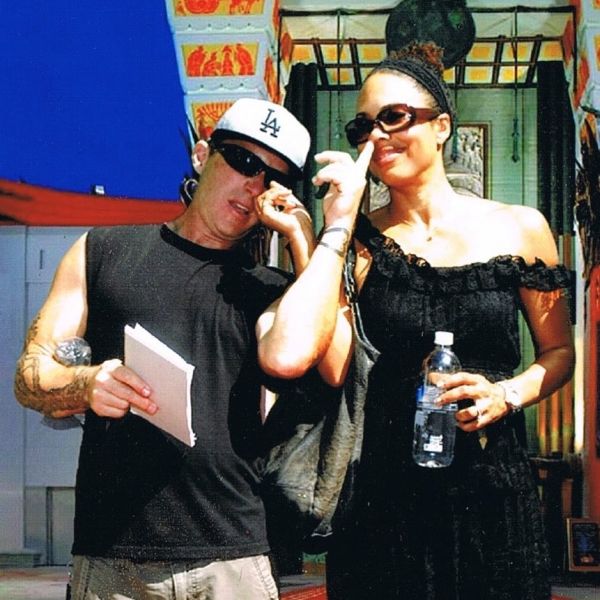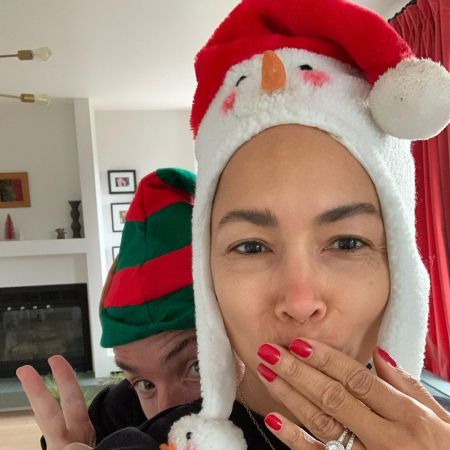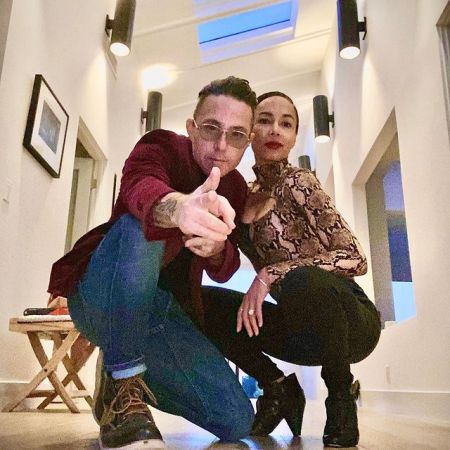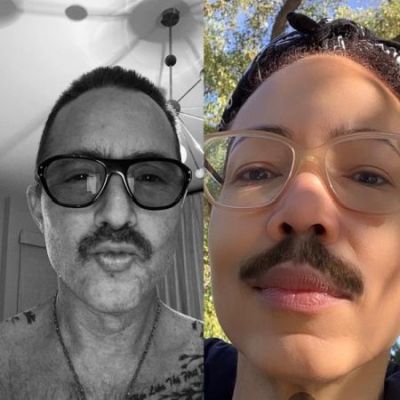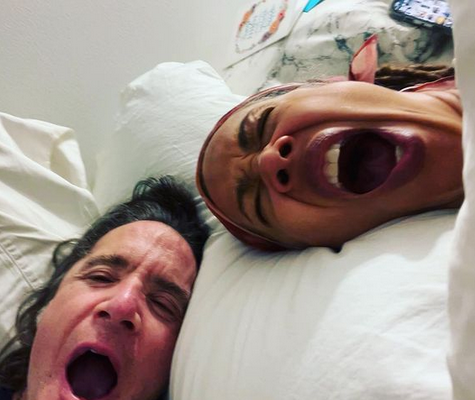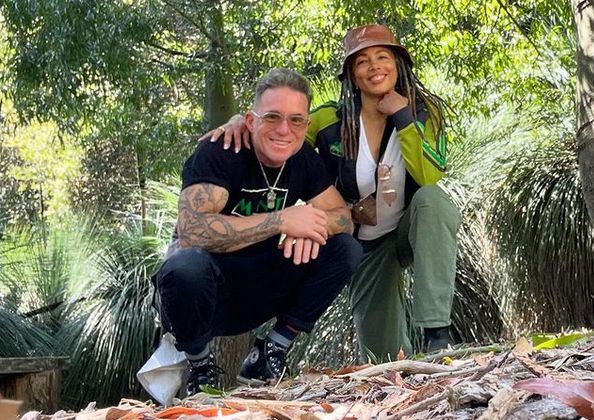
Ingrid Rogers
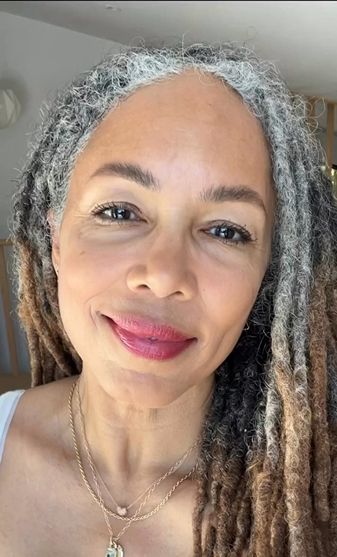
Rob Munic
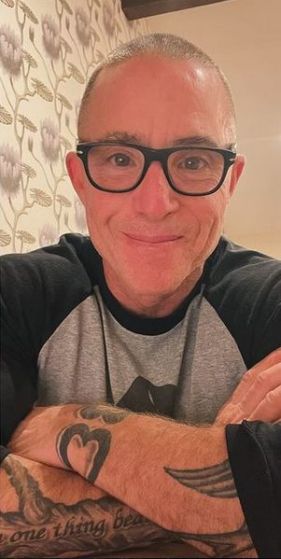
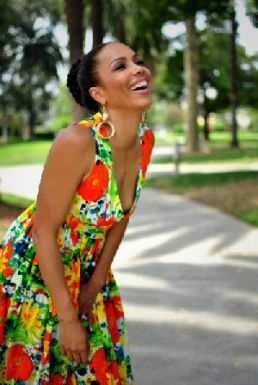
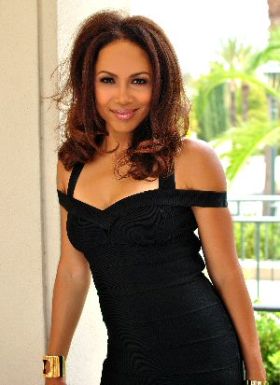
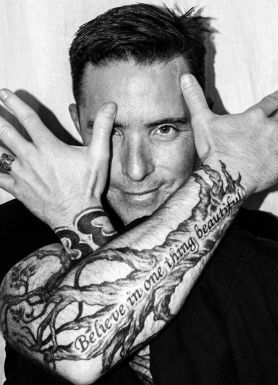
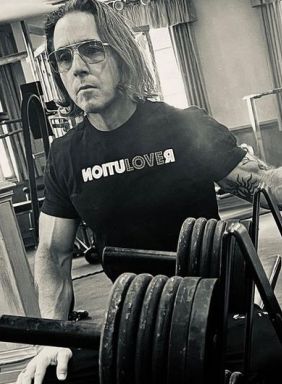
Visit Ingrid’s Website at theingridrogers.com
Friend Ingrid on Facebook at Ingrid Rogers
Follow Ingrid on Twitter at @theingridrogers
Check out Ingrid’s Instagram feed
Please visit Rob on LinkedIn
Friend Rob on Facebook at Robert Munic
Follow Rob on Twitter at @PTPMunic
Check out Rob on Instagram
Ingrid wrote the script for “Dancing Still” and also played Natalie.
Watch Ingrid’s demo reel here.
Watch other shows, movies and clips on Ingrid’s YouTube channel.
Rob Munic directed “Dancing Still”.
Rob and Ingrid have been married since August 2005, and while they both have their independent careers they enjoy working together whenever possible.
Ingrid and Rob did an exclusive interview in Ferreira Fest 35 (November 2012) where they discussed working with Louis on their short film Dancing Still. Read the interview below, and learn more about the movie in Ferreira Fest 35.

An Interview with Ingrid Rogers and Rob Munic
Listen to the sound file here:
FF – Well, let’s start with you guys. These are all questions that people have actually sent in to Ferreira Fest since June, since I said, well, you know, I met you in LA and at some point was probably going to have an interview with you. So this is what people have sent in so far. First question, and you can both answer individually: What inspired you to be an actor or a director? Or, in this case, also a screenwriter?
RM – Ingrid?
IR – Oh? Okay, I’ll start then. Well, my husband, as you know, is really the screenwriter of our family. But I was wanting to create something. I just didn’t… I felt like I wanted to say something, and I didn’t want to wait for an opportunity to present itself for me to say it. So, Robert had been encouraging me for years to write, and another close friend of mine said, “Hey, just start writing.” Like, I was in a class and he said, “Just write…” They’re called these flash scenes where basically you write characters and a situation and you give them to actors and then they just go. You know, they act out your scenario. So, he told me to write fifty of these – different characters and settings and such.
And I started on the process. And somewhere about four or five, just this idea came to me of relationships and life and the choices that we make in life that lead us to where we currently are. So, I wrote it and then I think you know the rest of the story, but Rob basically took a look at it and he said “That’s really good!” and then he had me go back and re-write it about, I don’t know, many, many times! And then he said, “Well, why don’t we shoot this?” And that’s how the writing journey started for me.
And as far as the acting journey, I got the bug in high school acting. And, when I was in high school, my theater class, the teacher brought in a newspaper clipping about Apartheid. And from there we wrote a play about it and I loved that there could be something so, mmm… a) – it introduced me to Apartheid because I really didn’t know what it was about.
And then, to be able to share that with people in an audience, I just loved that. And I was really inspired by that notion that as an actor I could get a message out to people that way. So, that’s when I got the bug. And I’ve just been doing it ever since.
FF – Been collecting bugs since then.
IR – Exactly!
FF – That’s fantastic. So, you’ve been at this for quite a while. And once you got into it it sort of won’t let you go.
IR – Exactly!
FF – Very cool.
IR – In fact… – Robert?
RM – Yes?
IR – And you know, Robert acted too, I don’t know if you know that?
FF – I did not know that! Oh, wow!
IR – Yeah! He started as an actor! Do tell, Roberto!
RM – I got into it because it was basically the only thing that could keep my attention that I was interested in. So, growing up, my teachers always said, “Why can’t you pay attention in school? Why can’t you focus? Why can’t you pay attention? What are you doing? Spacing out all day?”
And then, when I was like, I don’t know… my sister started acting professionally in Chicago when she was like six or five. And then, when I went through auditions with her… I remember I went on a Kentucky Fried Chicken commercial, to play her brother in the commercial. And the way the director did it he said, “Now there’s a marching band and they’re coming over a hill and you’re eating your chicken and you’re so excited and here comes a marching band, you see them?”
And the way he was doing it was just the first time I ever was like “oh my god,” I actually saw it, you know? I was a little kid! And then when I got older, I started just… by the time I had enough teachers telling me I couldn’t focus or pay attention, at that point I found the theatre department. I was like fourteen years old. And then just, bit it that way. Started doing a ton of plays in high school. Started working as an extra, everything that came through Chicago. I would walk through the middle of scenes during movies, to try to get on camera and disrupt the shot. I was asked off a huge movie because I kept improv’ing my own monologue. In the middle of a take I’d walk right in front of the star of the movie and start talking to him.
FF – Oh my god!
RM – And so, by the time I was eighteen, I knew I wanted to be in LA. So, I came out here, right before my nineteenth birthday. And got an agent about ten days after I got here. Had my first audition two days later and booked it. And then was on a plane to Hawaii three days after that, guest starring on a TV show.
FF – Oh my goodness! Wow! Talk about a whirlwind there!
RM – Yeah. And so then I worked as an actor for five years, six years. Did a ton of commercials, lot of guest spots. A lot of pilots that didn’t go to series. And then I was doing a miniseries and this director I was working… I’d been on the miniseries for about six weeks as an actor, and the director snapped his fingers at me and he said, “Hey you, come here.”
I said, “Uh, my name’s not Hey You, in six weeks.”
And he said, “Well, I didn’t hire you so I could learn your name. I hired you so you could learn your lines, get your mark and go home.”
And I was like, oh, okay, cool, so we know where we stand there! And then, around that time, I really wanted to start writing. I’d never taken a formal acting class, you know, never took a writing class. But I ended up taking this thing called Writers Boot Camp in Los Angeles, which is still around and is amazing. At the time, it was a crash course in screenwriting where you had four weeks to finish a screenplay, a feature screenplay, you had to do it in four weeks.
It was such a great discipline for me, having never written a movie before. And so I wrote it, I finished it, I gave it to my agent who represented me as an actor. And I said, “Hey, do you want to look at this?”
And they said, “Oh, Jesus, another actor who thinks they know how to write.”
And I said, “So, you don’t want to read it?”
They said, “No, we don’t want to read it. And don’t think we’re Kinko’s making copies for you.”
So I said, okay, cool. I gave it to my lawyer. She read it. She said, “This is great!” She read it on a Friday and by the following Wednesday we sold it.
FF – Oh my goodness!
RM – And the first call I got was from my agent.
FF – Oh, you’re kidding?! Oh, well, there’s serendipity for you!
RM – He goes, “I can’t believe you sold a script without us! How dare you!” And I said, “You know what? You didn’t want to read it, so, good-bye.” I didn’t say it that nicely! I don’t want to offend your readers with my salty language. But I said, you know, “Good-bye to you as a writer, good-bye to you as an actor and I’m done.” And that was it. And since then I’ve just been working as a, it’s nineteen years, I’ve been working as a writer, director and producer.
FF – Wow. Well, that certainly turned you in the right direction there because, from what I see from your IMDb page, you’ve been very successful at that.
RM – Yeah. And yeah, it’s funny, it’s probably, I would… the IMDb’s a funny thing, especially for writers. Because probably only a third of what we ever do gets mentioned, you know? A third of what we do actually ever goes into production. So, I can’t even tell you the seventeen pilots that I’ve sold and the fourteen features that aren’t even on there. But that’s the great anonymity of being a writer. You know, you keep working. So much stuff isn’t getting read.
FF – That’s fantastic! Rob, can you… since we’re on your production side, and Ingrid we’ll get back to you in just a second, do you want to talk a little bit about Pull The Pin Productions and the kind of work you do with that?
RM – It’s my company. And right now, it’s primarily the work that I bring in through the company. I’m currently working with three writers on original pilots that I’m developing with them as a producer. I’m in the process of optioning a graphic novel from these two writers. There’s a book that I’m trying to negotiate the rights to right now. So, it’s just about… you know material drives this business. So there’re some projects that I’m really excited about working with other writers, which is good for me, too, as a producer to not be writing all the time, but to be able to develop these original ideas with these other writers and then go out and sell them that way as a producer. So that’s been pretty good. And we’ve come across some really good scripts. Like I said, they’re all just in a different process of development, right now, in different stages. We’re working on a script with this writer who is working on this new one hour original which is great. We picked up another, kind of sci-fi, one-hour TV pilot from this writer from Canada. And then that graphic novel. So there’s all kinds of things, you know, you gotta keep developing stuff, you gotta keep generating material, and if you’re not generating it yourself, you definitely have to go out and find it.
FF– Right. Well, and it’s also important to not just keep doing one job and become a one trick pony. Because you never know where the next opportunity is coming from and you want to be ready for that. And the more geographical variety you have all over the place, the better it is, because if there’s an opening, go for it! It may not be what you’ve done for the last two years, but you’ve done it before. Sort of flip into that.
RM – Yeah, like even today, these producers sent me a children’s TV show (laughs) that they’ve already lined up air time for. And they sent it to me. And it’s kind of like, I don’t even know how you… it’s like a hipper Electric Company kind of thing. And they sent me the proposal and everything and asked me if I wanted to come on and executive produce a kids’ show. So, look it’s just, not that I think that’s something I’d necessarily follow or not follow, but I definitely would… look there’s a lot of material coming my way right now which is good.
FF – That’s fantastic. It’s always nice when you get to pick and choose. So Ingrid, what are your next projects? And please do tell us about Film Lab!
IR – Oh! Film Lab! Yes! Well, Film Lab is, it’s definitely not conventional. But I think it actually is more and more how we’re going to see independent film funded. And I think it’s already happening through platforms like Kickstarter and Indiegogo and I’m sure there are others too. But it’s a group of actors who study with this teacher, Paul Kampf, here in Los Angeles. And he has his school which is P.A.I., I think it’s Professional Artists Institute? (Performing Arts Institute) And the off shoot of that, what he wanted to do was, not just keep actors in class, you know? Being in class is a great workout, but he wanted to give the opportunity to actors to actually put it into production. So, he decided to launch Film Lab. And our goal right now is to raise $75,000 by November 28th, and with that $75,000 we’re going to shoot two feature length films. One comedy and one drama.
And it just gives the actors the experience of being able to produce something and not be waiting, for again, not waiting for opportunities to come. But, this is a vehicle to be able to act. And do what I love to do. And I get to play a homeless woman in one of the films. Which is something that I, you know, I would rarely get the opportunity to even audition for something like that.
So, for me, I get to stretch. It’s something out of the box for me. I’m having a great time creating the character. And it’s going to be a real blast just to have something completely out of the norm for me. So that’s what my focus is on right now. And I am… I have also a couple, one primary feature idea that I wanna get going on. It’s been percolating so I need to just sit down and start writing it now. But you know writing is such a solitary endeavor that it’s easy for me to find lots of things to distract me. (laughs) You name it! I find a way to get distracted from doing it, but that’s going to be my next (thing to) create too.
FF – There’s something very special about Dancing Still and the writing about it. And I was just so thrilled to hear that you’re continuing to do that and continuing to have an interest in that because, wow, what a beginning! And especially now, winning the award –
RM – Yeah!
FF – … at the OFF and everything, wow, I was just hitting the ceiling!
IR – Thank you, that’s very nice!
RM – Yeah, that… right out of the gate! Wins the award.
FF– That’s just absolutely fantastic. I mean, a lot of people work for years and years and never make it to that point. But your very first one, wow! So, congratulations! I was just so happy when I got the news.
IR – Thank you so much!
FF – And since we’re sort of segueing into Dancing Still at this point, and Ingrid, you told us a little bit how the whole writing and everything came about, but did you have any specific ideas? You said relationships was important to you, is any of that maybe drawn from real life or something that you read somewhere? Or that somebody told you that you remember? Because sometimes you make these leaps of logic that it’s sometimes even hard to trace back… how did I end up thinking about that… you know? And you look back and how did you end up there? Do you remember anything about that?
IR – Well, about the time that I started writing, one of my very first boyfriends contacted me, who I hadn’t been in touch with for many, many years. And, it was, I think, sort of a lot of ideas coming in at one time as I was writing. But that also just got me thinking about life. And, like I said, how choices that we make, sort of set a course in our lives. And how do those choices affect the direction of our lives? And as I got thinking about that, and just thinking about… I’ve always been interested in unrequited love. One of my favorite plays, I don’t know if you’re familiar with Harold Pinter?
FF – Oh yes!
IR – One of my favorite plays is Betrayal by Pinter.
FF – Yes, yes of course!
IR – And there’s just something that intrigues me, I think, about human relationships. Especially between lovers, men and women, and that sense of unrequited love. So, there was like just a few scenes that were all happening at the same time as I was exploring this world of writing and it all came together into what is now Dancing Still.
FF – Wow, that’s fabulous. I’m just always curious where things come from. And how much, you know, after a certain while it just sort of takes on a life of its own and the characters do come to life and do their own thing and they guide you where they want to go. But I’m always curious about where the impetus is, where was that first rock, you know? Everything. The little grain of sand that makes the pearl in the oyster, sometimes there is one and it’s really interesting to later on trace it back and it may have gone in a totally different direction. That’s always interesting to me.
IR – That’s right.
FF – So, Rob, it must have been, of course, a thrill for you to direct Ingrid’s screenplay right there. But beyond that, well, this is something that somebody you know very well wrote, what was it in the screenplay that fascinated you from a director’s point of view?
RM – Well, from a director’s standpoint, I knew right away, having read the draft of the script, you know, the nice thing is… Well, for me, I knew I wanted to be able to tell a really intimate story over not a lot of time, you know, I almost wanted it to feel like real time. Kind of like, the movie really plays in real time, it’s fifteen minutes in these peoples’ lives. And the cutaways are really the lies that they’ve been keeping from themselves and from each other. And it’s kind of that façade you put on and say, “Oh, great, everything’s great!” And then if you got to look into these peoples’ lives you would see in fact that it’s anything but. So, for me, the challenge was to create that intimate setting that didn’t feel like fifteen minutes was all of a sudden dragging on and feeling like an hour or, you know? So, pacing and everything was really important for me to be able to get them there. The nice thing is that Louis and Ingrid have history, having been friends for a while, and we knew that we wanted to cast Louis in this, in fact we pushed the shoot, right? (to Ingrid) We pushed it a few times to coordinate Louis’ schedule.
IR – No, I think he was coming back. We may have pushed it a little bit but we knew we wanted him to do it. So, it worked out well.
FF – Were those flashbacks and the little cut-ins, were those part of the script? Or was that something that you decided to put in afterwards?
IR – That was all Robert. That was Robert saying his, and that’s a testament to his, or a credit to his talent as a director. Because he really… it’s a visual medium and he saw how important it was to show that and to move the story along a lot better. And it gave just such a great history too, for the characters.
FF – It’s also, really, I mean visually, from just watching the movie, it’s an interesting, just a different point of view and it’s a very strong contrast to the space that they’re in. And then, I mean the coloring is different, it’s so much, it’s very different in the flashbacks and in those cut-ins than the coloring, which is consistent, in the space that they’re in. It just knocks you out of there, like a whack in the head! And then it whacks you back in and you go like “Whoa!” this is almost, hits you in the face the way that a memory like that would hit you in the face. And so I thought that, as somebody watching the movie, was a very, almost a physical way of watching the movie because you make that jump with the characters. Which I thought, from a viewer’s point, that was really, really interesting, how that was done.
RM – Thanks. Well, we created… Jeff Myers and I, who was our DP (Director of Photography)… we really wanted the space to have a very stark feel to it. But at the same time have just enough warmth that it didn’t feel… because that space could have gone two ways – it could have been really sterile and cold, but we really wanted to warm it up.
Especially with what Ingrid’s character is going through, to make that space cold would’ve, I felt as a director, been too manipulative. And, you know, to do hard light in there and all that would have been just too cheap to achieve what we wanted to achieve with her character. So, Myers and I really designed that space to have a warmth and a real intimacy, with just pools of light and pockets of light that they would be able to move in and out of. And to contrast that as, like you said, it’s a memory, so what I said to Myers is, “When we shoot the flashbacks and stuff, I want everything to be shot directly into the light, a ton of back lighting, really, really open up the lens so it’s real hot, and it has a different kind of warmth to it.” Because you want to remember beauty and flow, and you feel the warm breeze, but then with the husband and Louis’ (character’s) girlfriend, you want that to be a little bit harder, you know?
So the light’s real hard edged in those moments. But I think Jeff Myers did an incredible job. You know we shot the whole thing like in a day and a half?
FF – That’s just incredible to me. I mean, and there’s so much content in it, too, and we’ll get into this in just a little bit, as well, about the shooting and all that. But one scene that stuck out in my mind, just in my head, the first time I’d seen it, and still sticks out to me every time I watch it – there’s this one scene where we have this close-up on Ingrid’s feet? You know the one where the feet that are all taped up and everything, and I just love, love, love that moment! It’s just, I think it’s just brilliant. And whoever’s idea that was, that was just, it’s one of my favorite moments in the movie.
IR – Oh that’s lovely. That would be Robert. Again.
RM – Thank you, dear. Because that one shot tells you, it informs you that this is a person whose body is breaking down. She’s all taped up around her ankle. Her feet, in that shot are, they’re filthy and they’re calloused, and they’re covered in chalk. So that’s the life you see on her. You know how sometimes you can see how a person’s lived by their hands or their face? For Ingrid’s character, you see her story through her feet. And she’s breaking down. She’s, you know dancers, their bodies, over time like athletes, start to break down. For Natalie, her body, and we learn much more than just the ankle, but her body is breaking down and, you can’t hold it together with tape anymore but she’s still trying. That’s why I love that shot as well.
FF – Right. Yeah. It’s just such a beautiful moment and I remember it really touched me deeply the first time I saw it and somehow I still get that feeling when I watch it. It never loses its impact. So it’s really a beautiful, beautiful scene there.
FF – Well, from feet to Louis! How did you guys first meet Louis?
IR – Well, we have two different accounts. So let me tell you my account first and then Robert will tell you his. I was in Toronto a few years ago and one of my good friends from acting school is close friends with Louis. He’s also really a great actor, Tony Nappo, and he lives in Toronto. And Tony and Louis, we all met up at Ontario Place, and that was my first time meeting Louis. So this was probably three or four years ago. I think?
RM – Probably more.
IR – Maybe. Yeah. Something like that. Probably four. At least four years ago. And, you know, hanging out with Louis, I turned to him at one point and I said, “You have to meet my husband,” I said, “You guys would get along so well.” And he was like, “Yeah, okay, okay.” And he wasn’t sure when he was going to be back in LA. Anyway, lo and behold, he’s back in LA, I don’t know, a couple months later, and it turns out that another mutual friend of his, what’s his name again?
RM – Carmine Giovinazzo
FF – Yeah, right right.
IR – Yeah, invites Louis to go golfing. And Robert is there too.
RM – So, I walk up there and Louis is up there, you know, with his socks pulled up to his knees and his, you know, hates everything about the clothes that he has to wear. And he’s griping about it and this and that, but he’s, you know, he’s Louis, so you love him right away! And I’m standing there and he’s like, “Yeah, how ya doing? How ya doing? Nice to meet you…” you know, doing his thing. And I said, “Hey man, we met like ten years ago, we used to play ball together, basketball at the Y.” He used to come with Carmine and play ball at the Y, ten, fifteen years ago. So that’s when I first met him. But then as we’re on the golf course I said, “Hey, I was the original writer of the Trump movie.”
FF – Oh my god, were you really?
RM – Yeah, I wrote the first four drafts of that teleplay. It was just one of those things where, it was like… fortuitous.
IR – It was fortuitous. We were meant to meet and be friends.
FF – Oh that’s fantastic! I had no idea. That is great. Wow.
IR – We love Louis.
FF – So, what is it about him, or that you know about his work, that made you choose him specifically? I mean you said early on that you knew that you wanted him to play it, but what was it about him that you knew, or from his work, that he was the right person for this role?
IR – There was, I mean, as I was writing it, he came to mind right away, that I wanted him to play it. And I feel there was a moment that we shared… let me think of it… there was something that happened and I thought there was a sensitivity that he brought to it that I knew that I wanted the character to embody. And I’m trying to remember what that came from and I don’t know if it was just conversations that we’ve had together about life and kids or…
RM – No, it was when we were at Hugo’s and he sat with Ajna.
IR – It could have been that, too. I mean, he and my son, Louis and my son have such a great rapport. My son loves Louis. But there was a… and you know… Louis could have been like my first boyfriend twenty years ago. He was like that kind of guy. It’s very conceivable that that’s what happened. So something about all those qualities I thought were just what Shane was like. Like you could have had a tumultuous relationship and I knew Louis would bring that depth to it. And the humor. And he didn’t disappoint!
FF – So, Rob, was there a particular moment that, your point of view from that now, was there a particular moment during filming when you said to yourself, yes, these two actors work brilliantly together? That you knew you were seeing something very special unfold in front of the camera.
RM – Absolutely! I mean, even before that we rehearsed it for a few days just to find the rhythm and rework the script and tweak some things. And I knew even prior to shooting that we were on to something. Just because Ingrid and Louis’ rapport, and their level of comfort with each other is so solid. You know? And because we know Louis so well and spend so much time with him, that he’s family. So, the rehearsal period was great, and they were finding things that worked for them. And then when we got on the set, once it was lit and ready to go I just kinda, I locked off the camera with Myers on a wide shot and I said, “Well, let’s just block it, I’m gonna turn the camera on and you guys find it.” And they did the entire movie, beginning to end, perfectly blocked, in one take!
FF – Wow!
RM – The whole thing! It was a twenty-four and a half minute take originally, right? They went through the whole thing in twenty-four minutes, nonstop, together! They didn’t miss a beat and we cut and I was like, “Holy shit!” We have the whole master now. We never have to go back to it. And the fact that they picked up and covered up and if lines were dropped they were right there for each other, they had that familiarity? You know, there’s a line in the movie when Louis says, “So, uh, tell me about your daughter.” The original line was, “How old is your daughter?” Right? So he goes, “So tell me about your daughter.” And Ingrid’s like, “Oh, yeah, yeah, Libby, she’s ten…” It’s just like they have such a natural rapport that they were able to pick up each other’s lines and cues, and it was just awesome! You know, I can’t remember directing anything like that where you have a twenty-four minute take where I’m just sitting there.
The only other time that ever happened was when I was directing a movie years ago for Showtime with Michael Clarke Duncan and he was doing this monologue. And I was so moved by his performance during this monologue that… and the whole crew was speechless… that I forgot to call cut. And my AD came over and leaned in my ear and he said, “Do you wanna cut? You should probably cut.” So I got so caught up in this man’s performance that, you know, and that’s the only other time it’s happened. But with Louis and Ingrid, man, they pulled it off in twenty-four minutes! It was unbelievable. So I knew we had something. And then moving in for all the coverage and the two-shots, and the hand holds and the looks and the gazes and the thumbs rubbing each other, that was all just, that was fantastic.
FF – So, you said it was a twenty-four minute take the first time through. So were there any scenes filmed that you had to cut due to time constraints? Or was it determined by story continuity? Or film length?
RM – It was story. We really wanted to keep the story moving. We really wanted to keep a good pace. The first cut was about twenty-five minutes. We’ve cut about five, six scenes out of it. And you don’t miss them. You know, it’s funny. Ingrid missed them at first.
IR – Well, that’s because I’m the writer!
FF – Because you wrote them, yes.
RM – Right. And I kept saying, like, you know, as a writer sometimes you gotta kill your babies. Right?
IR – Eeew.
RM – But that’s what they say in the writer’s room. Like you can’t be so precious, sometimes you gotta let it go, you gotta let it go. She’s like, “Well, let’s try it again with this. Then let’s try it again with that.” And finally, you know, part of collaboration and also Myers, being an editor as well as a DP and our producing partner on it, he just started taking stuff out and then he would show me. And I’d go into the cutting room and he would, I’d watch it and I’d go, “Something’s different.” And he goes “Yeah, ‘cause I took that whole scene out.” And really constructed some really beautiful, beautiful moments. So, you think you miss them at first, and you do, because there’s a little emotional connection to them? But once they’re gone long enough you go, “Hey, this is actually for the good of the project.”
IR – Yeah.
FF – Right. You go through a little bit of a grieving process, I’m sure, and then you let it go. And then you understand that it’s okay, and it’s good the way it is.
IR – That’s right. Exactly.
FF – I have a little quote here that I’d like to read to you that relates directly to the movie. And this is from a reader from Ferreira Fest. And she just saw the little trailer and this is what she wrote. “I was moved by the photo,” and it was just a screenshot, “from Shane and Natalie, where Shane and Natalie are at the dance barre and their fingers are just touching. I thought the looks on their faces told a lot of the story. Wistfulness. Sadness. And missed opportunities. Decisions made that might have been wrong in the long run of the character’s life experiences.” And now, her question is, “Did the vision of Ingrid’s written screenplay come across for her on film? And did Louis pull anything from her by his performance of Shane that she didn’t expect?”
RM – That’s great!
IR – Wow! That’s a great…
FF – Isn’t that a great question?!
IR – Yes! Very astute observations too. You know there’s a scene, just to answer the end of the question first, was, when we’re at the barre and we’re about to kiss? I think he brought, there was just that moment of, oh! I don’t even know how to articulate it. but he, it was totally what he gave me that allowed me to have that moment. It was just that moment of, I wished it was… it was conflicted of wanting it to happen but knowing it shouldn’t happen. And, um…
RM – And I was like – it ain’t gonna happen!
IR – (bursts into laughter)
FF – You were like, right!
RM – I’m like, “Hey man, she didn’t write, she didn’t write no kisses in the movie!”
IR – That’s funny! So, that was a lot. He definitely brought that out. But you know, honestly, it’s almost like, that’s a poignant moment that sticks out for me. But each moment, I think that’s the beauty of acting if you’re… it’s a give and take between your fellow actors. And he’s a very giving actor so it’s nice to work with him. Was there another question there? I can’t remember.
FF – Yeah. Did the vision of your original screenplay come across for you on the film?
IR – Oh, absolutely! And more. Honestly I think Robert really brought it to life even more with what he brought as a director and his vision of it. I mean, I was so happy and touched that it inspired him enough for him to go, “Let’s shoot this.” You know? And so, because trust me, I’ve brought other ideas to Robert and he’s like, (bored voice) “Yeah, okay.”
IR and FF giggle
IR – I’ve never actually written anything, so I can’t… that’s not totally fair. But sometimes I’m always throwing out ideas, I’m like, “Hey babe, what about this? This idea for a TV show? Or this for a movie?” And he’s very, he’ll listen to me and then move on.
FF – Right.
IR – So I think it was everything I wanted and much, much more. So I’m very happy with the end result.
FF – It’s really amazing when you especially look at editing screenplays, when taking away something makes it actually bigger. When people put their stuff in, you know?
IR – Yeah, and that was so a testament to Jeff. Our editor, DP and EP. I mean, that’s also a testament to him, because he and Robert work really well together. I think they’ve worked together for a long time and so they have a nice shorthand together. And he definitely had a lot, a big part of the tuning it down and being able to take things out. As much as it hurt, at first, me as a writer, I saw in the end that it was definitely better for the project as a whole.
FF – Right. And then at that point it becomes also, it becomes a collaborative effort. It’s not like a novel that’s yours and yours alone. But the moment you do a screenplay or theater or a dance or anything it’s always a collaborative effort and it’s important to let go. And just have other people add their thing and sometimes it really surprises you, and actually becomes more than it was. So it’s always nice when that happens.
IR – That’s right. Absolutely.
FF – Question for both of you – what’s your favorite memory about working with Louis on Dancing Still? Were there any special moments, and this is not necessarily the movie but the production process, any special moments or fun times or stuff that happened in between takes that you remember?
IR – Oh, maybe we should send you some pictures, we have some great pictures of him.
RM – We have amazing photos from behind the scenes.
IR – Of him being just a goofball. His usual Louis-goofball-self behind the scenes.
FF – I was gonna beg for pictures in another three questions but go ahead and promise me some now, it’s good!
IR – I’ll send you a few.
FF – That would be fantastic!
IR – Okay, yeah, we’ll send some.
RM – Yeah we have a lot of stuff. He brought Billie on set.
FF – Oh my goodness, yeah, the bulldog puppy.
IR – But she stayed in the car a lot.
RM – Yeah, but not before she took a huge poop!
FF and IR (laughter)
IR – I missed that! I must have been in makeup at that time I think.
FF – Well, there you go!
RM – He brought Billie, she made a big poop right by the loading door.
FF – Oh no!
RM – So Billie goes back to the car! But yeah we, it was great. You know, the nice thing about Louis is, Louis is a guy who, he’s literally one of these actors who, when he’s in the scene, is so unbelievable, and the minute you call, “Cut!” he’s like, “Hey, how’s everybody? Fantastic! Oh Guten Tag…” you know he’s doing like his Louis?
FF – Right!
RM – And then you’re like, “Action!” and then he’s like “Shouldn’t have left you, I love you.” Breaks your heart and you’re like, “Cut!” and he’s like, “Brrrup, bopbupbopbup,” walking around the set, going to Craft Service, shoving four hundred peanut butter cups in his mouth, you know? And then you’re like, “Louis, back on set, action!” And then he just turns it on. And that’s what’s so great. He’s not one of those actors who has to sit there all day in character, and you can’t talk to them in between takes because they have a big moment coming up. It’s like you can flip this switch and he goes. You know?
FF – Yeah, that’s one thing that Peter Kelamis also mentioned. I did an interview with him a couple weeks ago for the last (Ferreira Fest)… I don’t know if you saw it. But he mentioned the same thing, that sometimes, when they have had guest artists on set for Stargate Universe it confused them completely because they couldn’t figure out what was going on, you know, it was just this dual personality thing that happened there on a dime.
RM – Well, that’s thing. He’s, you know, Stargate is like, “We need to get this ship on Earth before we all die!” and then they’d be like, “Cut!” and he’d be like, “Fantastic, hey! How ya doing?” you know? And people don’t understand. And that’s why Louis is such a good actor because he literally flips it in a second, you know? And they’re like, “Louis, Louis!” And he goes, “Hey just, just turn on the camera Rob Munic, you’re gonna get the Louis, don’t worry about it, you’re gonna get the Louis!” You know? And you do! You never get a bad moment. So, that’s what’s amazing.
FF – And there’s very few actors that can pull that off, and pull it off well. And still be true to the role that they’re playing. Something usually has to give, but, not there.
RM – Right.
FF – All right, here’s the trick question, and you can think about this one for a little while, because… or discuss amongst yourselves… and this is a question that everybody gets who gets interviewed for Ferreira Fest, so – If you could describe Louis in four words, what would they be?
IR – Fantastic (mimicking Loius’ inflection)(laughter)
RM – I would say – Fantastic, loving, hysterical and gassy.
IR – (claps her hands) Oh, that’s a good one! Gassy is a great one! Oh my god, that’s priceless!
RM – That’s my four words.
FF – Okay! Ingrid, you have different four words?
IR – I have to take… can I use gassy? Um, okay, what else do I want to add? I said fantastic, so I think we’re both aligned with fantastic and gassy. Let me come up with two more. I think he’s, what’s the right word for someone that’s always game? He’s like…
RM – Adventurous.
IR – He’s adventurous… hmmm, what’s another word for him? How about a seeker?
FF – Okay.
IR – Seeker. He’s always looking for some answer. Oh, no, no, no, no, screw seeker, that’s too noble for Louis. Let’s go with a romantic.
FF – A romantic, okay. All right, awesome, so that’s your eight words, in your case for two people. Well, seven words because, or six, actually because you’re sharing a couple. So that’ll work. Well, anyways, I’m literally at the bottom of my list. So, is there anything else that you want to say? Or want to take from that?
IR – Just, thank you. I mean thanks so much for taking the time to do this and the exposure for this is really great. So we look forward to a) I’m going to send you the pictures and also be able to share the full movie with you soon.
FF – Well, thank you so much guys. I really appreciate it.
IR – Thank you! Thank you!
RM – Thank you!
FF – This is gonna be like the mega transcript and I’m sure Louis will enjoy hearing about his gassiness and everything! (laughs)
RM – It all reflects the love!
FF – Well, I’m sure he’ll feel it. All over. But thanks again so much.
RM – Thank you.
IR – Have a good night.
FF – Yeah, you too, and thank you for spending over an hour with me. That’s really awesome and I really, really appreciate it.
RM – You got it!
IR – We enjoyed it!
FF – So, I’ll talk to you soon!
RM – Okay, bye-bye.
FF – Bye-bye!
Please join us in thanking Casey for the amazing job of transcribing this huge interview for us! What a true labor of love this has been! And thanks again to Ingrid and Rob for graciously spending well over an hour on Skype with us, talking about Louis and DANCING STILL.

And in the spirit of Louis, here are some goofy pictures of Ingrid and Rob! Thanks for sharing the fun!
